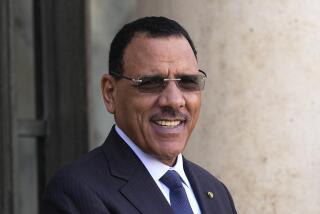President of Burundi Ousted by Military
- Share via
NAIROBI, Kenya — Soldiers in the small African country of Burundi ousted President Jean-Baptiste Bagaza on Thursday while he was out of the country and set up a ruling junta under an army major, official Burundi radio reported.
Bagaza, a 41-year-old socialist with ties to Moscow, was in Quebec attending a summit meeting of French-speaking nations. He left the summit Thursday when rumors of a coup began circulating and took a plane for Paris.
“Bagaza is relieved of his duties as head of state, party and army,” said a statement from army headquarters broadcast by the radio and monitored in Nairobi.
There were no immediate reports of damage or injuries in the former Belgian colony of 5 million people wedged between Tanzania and Zaire in East Africa.
Military Council Formed
The radio said the army established a Military Committee for National Redemption under Maj. Pierre Buyoya.
Bagaza took power in a bloodless coup in 1976. He was facing tribal and political problems and was at odds with the Roman Catholic Church in his largely Catholic country.
It was not possible to get independent verification of the radio announcement. Burundi radio said the borders and airports were closed and urged people to “remain calm and maintain peace and security inside the country.”
Telephone operators in Nairobi were unable to get through and said the lines may have been blocked in Bujumbura, the capital of Burundi.
Soviet, Chinese Aid
Bagaza was receiving technical and financial aid from the Soviet Union and China and was strengthening ties with Libya.
All officers in Burundi’s army come from the minority Tutsi tribe, which is outnumbered nearly 6 to 1 by the Hutu majority.
Hutus rose against their Tutsi rulers in 1972, and a systematic massacre ensued in which more than 100,000 Hutus, including many of the tribe’s professionals, were killed.
Bagaza took power in November, 1976, when he was an army colonel, overthrowing the government of Michel Micombero, one of Africa’s longest serving heads of state.
Coffee Provides Income
Burundi, about the size of Maryland, is among Africa’s smallest, poorest and most densely populated countries. It has few mineral resources, no strategic value and gets 80% to 85% of its foreign exchange from coffee.
The country has enjoyed stability under Bagaza’s rule. Despite socialist policies, he has welcomed investment from the West and received Western aid, which roughly equals the treasury’s annual income of about $1 million.
He tried to bring Hutus into the mainstream, putting some into his government. This year, Bagaza introduced the first Hutu cadet officers into the army.
Was One-Party State
Burundi, which had no parliament when Bagaza took over, was moving slowly toward civilian rule, and a National Assembly was elected in 1982 under a new constitution. It has been a one-party state since independence from Belgium in 1962.
Opposition to Bagaza’s reforms came from some old-guard Tutsis who feared their own downfall.
His government was involved in a growing conflict with the Roman Catholic Church, to which 65% of Burundians belong. The government banned weekday church services June 4, closed church schools earlier this year and jailed three defiant priests.
More to Read
Sign up for Essential California
The most important California stories and recommendations in your inbox every morning.
You may occasionally receive promotional content from the Los Angeles Times.










